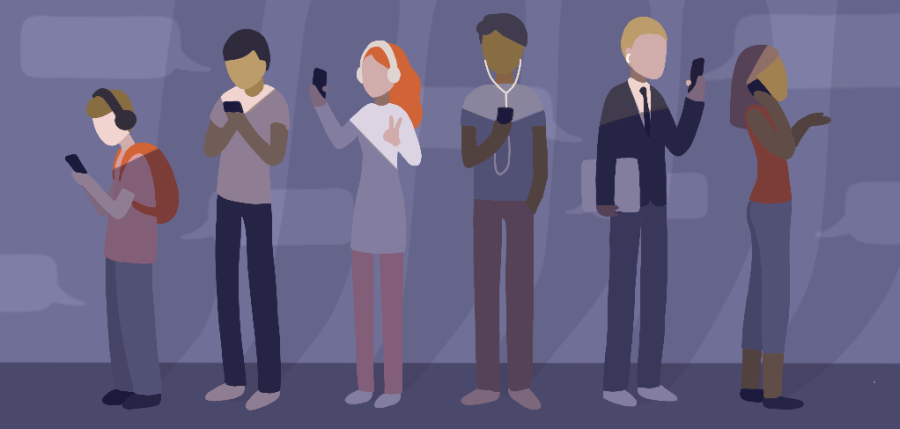Editorial: Collectively escaping the social media trap
The facade of the perfect life on social media has never been more common or easier to create. Although we’re all aware of these unrealistic standards, seeing other peoples’ ‘perfect’ lives on our feeds still takes a toll on our mental health. Apps such as TikTok and Instagram only worsen the problem with filters and growing concerns over likes and followers.
An app that calls itself authentic, original and unique. An app that captures the happenings of everyday life. An app that has no likes or filters. This is BeReal, a social media platform which has skyrocketed in popularity with its promise to show you “your friends for real.”
Yet, BeReal still brings with it the dilemma of “being real” while simultaneously conveying the best version of yourself. Though the app strives to be a “unique way to discover who your friends really are” according to the BeReal website, the common pressure across all social media sites of portraying only the perfect moments of your life is still tangible. Giving into social media’s demand that our lives be flawless and filtered is impossible since the reality is that our lives will never be that way. Whether they aim to or not, BeReal and social media sites as a whole still perpetuate the sense of competition for who can have the most photo-worthy, picturesque life.
The facade of the perfect life on social media has never been more common or easier to create. Although we’re all aware of these unrealistic standards, seeing other peoples’ ‘perfect’ lives on our feeds still takes a toll on our mental health. Apps such as TikTok and Instagram only worsen the problem with filters and growing concerns over likes and followers.
The pressure of being available digitally for others is also nerve-wracking but unavoidable. We often feel the urge to check our phone for new messages or scroll through our social media feeds because of the fear of missing a text or a conversation in a group chat. Phones have become an extension of ourselves — the impulse to constantly check our phones in order to be able to respond to others quickly combined with the intentionally addictive design of social media apps drives a psychological dependence on the device.
We also rely on our phones to escape from reality. With 95% of U.S. teenagers having access to smartphones, our phones have become ingrained in our daily lives, now more than ever after quarantine. During the pandemic, we strengthened our unhealthy reliance on social media and technology; after all, it was the only way to connect with others. Consequently, in uncomfortable situations in person, our phones act as ‘safety blankets’ for us and offer respite from awkward or boring conversations which plague our day-to-day lives. But how can we grow if we use our phones to shy away from awkward situations?
Though communication and forms of technology like Schoology are still essential to our lives, we can challenge ourselves to limit our social media usage, clicks, taps and scrolls and limit our screen time as a whole. Instead of retreating to our phones in the presence of a classmate, we can try starting a discussion with them or try using our phones to further social interaction.
As a result of quarantine, we became accustomed to using social media to connect online, but in person, the true way to “BeReal” is to place ourselves in the moment, not escape to our phones through social media, which only drives us apart.

Ariana Goetting (12) is the co-editor-in-chief of the Winged Post, and this is her fourth year on staff. This year, Ariana looks forward to designing creative...


















![“[Building nerf blasters] became this outlet of creativity for me that hasn't been matched by anything else. The process [of] making a build complete to your desire is such a painstakingly difficult process, but I've had to learn from [the skills needed from] soldering to proper painting. There's so many different options for everything, if you think about it, it exists. The best part is [that] if it doesn't exist, you can build it yourself," Ishaan Parate said.](https://harkeraquila.com/wp-content/uploads/2022/08/DSC_8149-900x604.jpg)




![“When I came into high school, I was ready to be a follower. But DECA was a game changer for me. It helped me overcome my fear of public speaking, and it's played such a major role in who I've become today. To be able to successfully lead a chapter of 150 students, an officer team and be one of the upperclassmen I once really admired is something I'm [really] proud of,” Anvitha Tummala ('21) said.](https://harkeraquila.com/wp-content/uploads/2021/07/Screen-Shot-2021-07-25-at-9.50.05-AM-900x594.png)







![“I think getting up in the morning and having a sense of purpose [is exciting]. I think without a certain amount of drive, life is kind of obsolete and mundane, and I think having that every single day is what makes each day unique and kind of makes life exciting,” Neymika Jain (12) said.](https://harkeraquila.com/wp-content/uploads/2017/06/Screen-Shot-2017-06-03-at-4.54.16-PM.png)








![“My slogan is ‘slow feet, don’t eat, and I’m hungry.’ You need to run fast to get where you are–you aren't going to get those championships if you aren't fast,” Angel Cervantes (12) said. “I want to do well in school on my tests and in track and win championships for my team. I live by that, [and] I can do that anywhere: in the classroom or on the field.”](https://harkeraquila.com/wp-content/uploads/2018/06/DSC5146-900x601.jpg)
![“[Volleyball has] taught me how to fall correctly, and another thing it taught is that you don’t have to be the best at something to be good at it. If you just hit the ball in a smart way, then it still scores points and you’re good at it. You could be a background player and still make a much bigger impact on the team than you would think,” Anya Gert (’20) said.](https://harkeraquila.com/wp-content/uploads/2020/06/AnnaGert_JinTuan_HoHPhotoEdited-600x900.jpeg)

![“I'm not nearly there yet, but [my confidence has] definitely been getting better since I was pretty shy and timid coming into Harker my freshman year. I know that there's a lot of people that are really confident in what they do, and I really admire them. Everyone's so driven and that has really pushed me to kind of try to find my own place in high school and be more confident,” Alyssa Huang (’20) said.](https://harkeraquila.com/wp-content/uploads/2020/06/AlyssaHuang_EmilyChen_HoHPhoto-900x749.jpeg)




bradley • Oct 21, 2022 at 11:17 am
Is this just another way to have us be on our phones more? Now I have to have my phone at the ready all day long, otherwise I might miss my window😧.